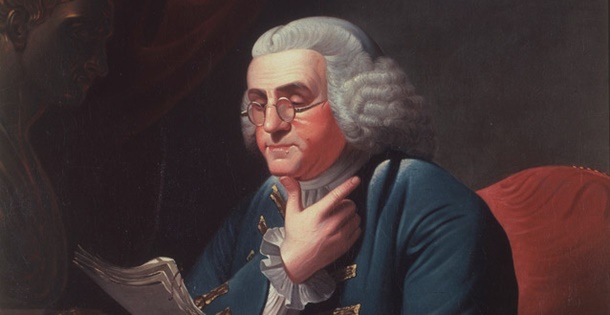A set of values defined in 1741, in his own words.
- TEMPERANCE. Eat not to dullness; drink not to elevation.
- SILENCE. Speak not but what may benefit others or yourself; avoid trifling conversation.
- ORDER. Let all your things have their places; let each part of your business have its time.
- RESOLUTION. Resolve to perform what you ought; perform without fail what you resolve.
- FRUGALITY. Make no expense but to do good to others or yourself; i.e., waste nothing.
- INDUSTRY. Lose no time; be always employ’d in something useful; cut off all unnecessary actions.
- SINCERITY. Use no hurtful deceit; think innocently and justly, and, if you speak, speak accordingly.
- JUSTICE. Wrong none by doing injuries, or omitting the benefits that are your duty.
- MODERATION. Avoid extremes; forbear resenting injuries so much as you think they deserve.
- CLEANLINESS. Tolerate no uncleanliness in body, cloaths, or habitation.
- TRANQUILITY. Be not disturbed at trifles, or at accidents common or unavoidable.
- CHASTITY. Rarely use venery but for health or offspring, never to dullness, weakness, or the injury of your own or another’s peace or reputation.
- HUMILITY. Imitate Jesus and Socrates.
In this piece it was my design to have endeavored to convince young persons that no qualities were so likely to make a poor man’s fortune as those of probity and integrity. My list of virtues contain’d at first but twelve; but a Quaker friend having kindly informed me that I was generally thought proud; that my pride show’d itself frequently in conversation; that I was not content with being in the right when discussing any point, but was overbearing, and rather insolent, of which he convinc’d me by mentioning several instances; I determined endeavouring to cure myself, if I could, of this vice or folly among the rest, and I added Humility to my list.
Become a Saturday Evening Post member and enjoy unlimited access. Subscribe now




Comments
In his autobiography, Benjamin Franklin demonstrates throughout the text how he achieved financial independence in his 30s, and wealth in his 40s. In my book ‘Wealth Virtues’, I redefine wealth as simply the goal of ‘acquiring more money than you spend, and to save more money than you owe.’ The path set forth in ‘Wealth Virtues’ towards this goal is the Cycle of Positive Wealth, my own repeatable methodology of eliminating debt and increasing your savings. What keeps you on the path is the practice of Dr. Benjamin Franklin’s Thirteen Virtues. In essence, “improve yourself to improve your wealth!”